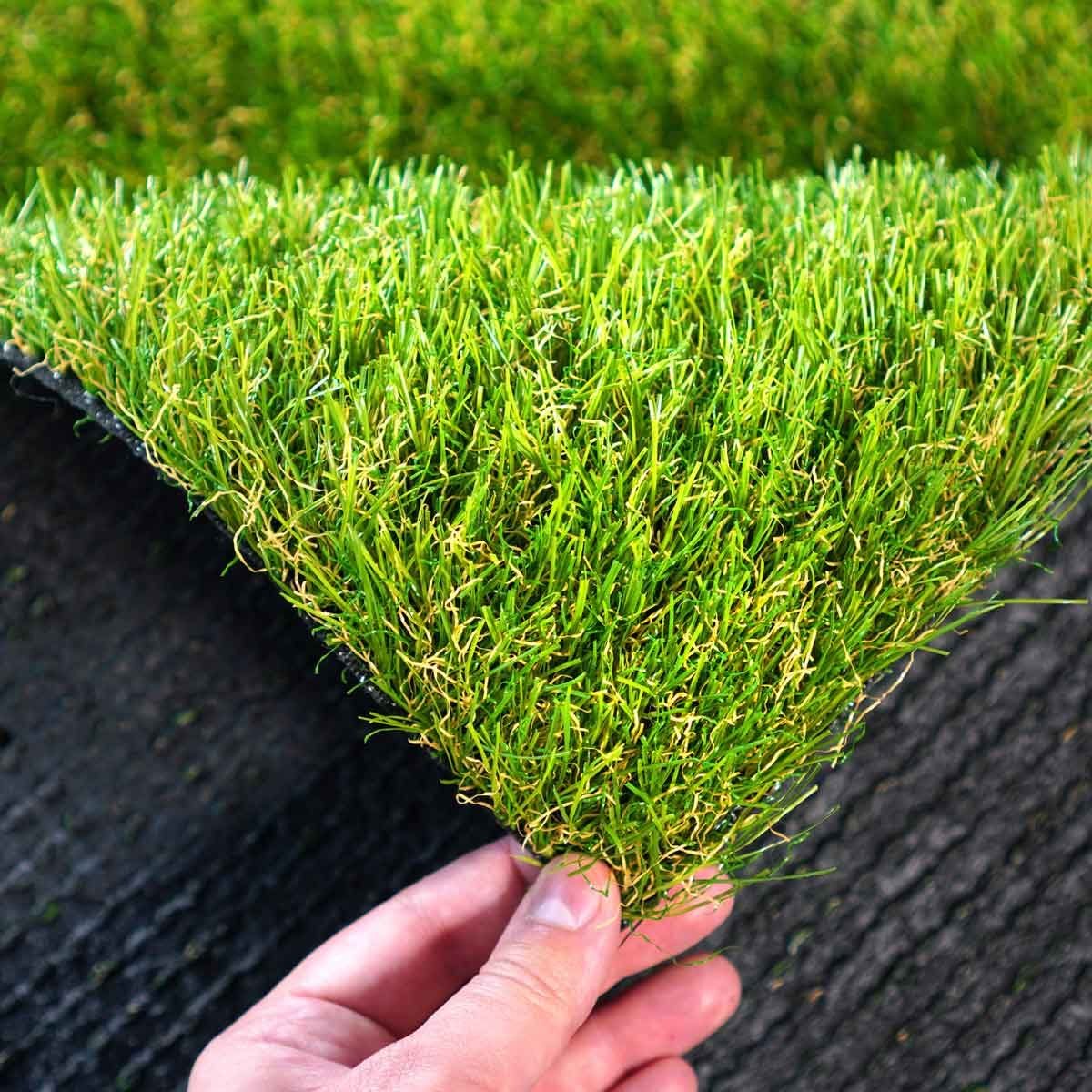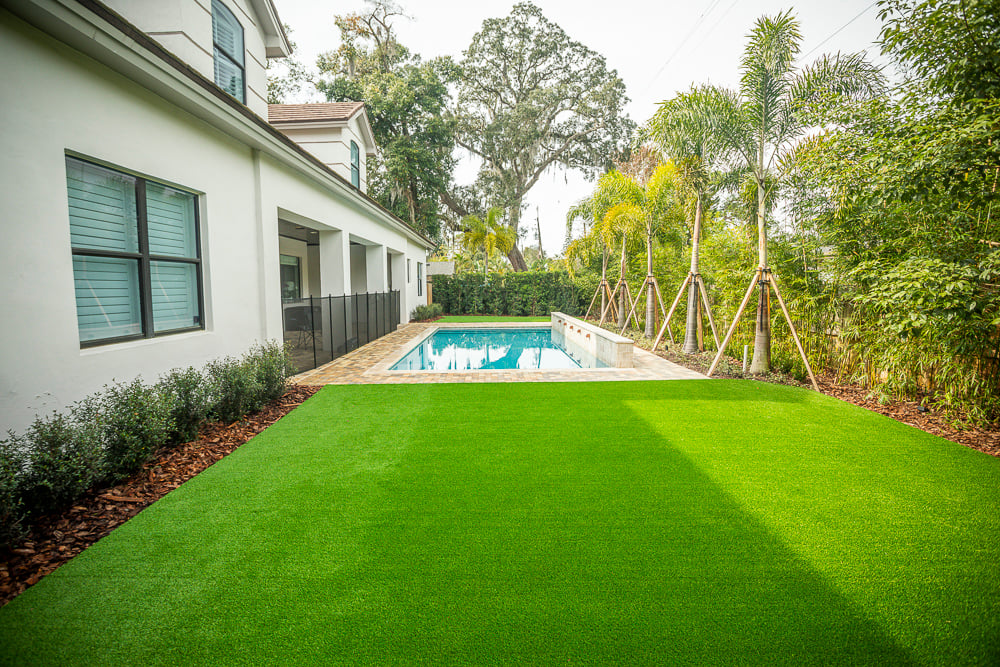Experience a Perfect Lawn with Arizona Artificial Turf for Any Outdoor Space
Experience a Perfect Lawn with Arizona Artificial Turf for Any Outdoor Space
Blog Article
Delve Into the Environmental Perks of Opting for Synthetic Grass Solutions
The fostering of artificial lawn options offers a compelling possibility to address pressing environmental obstacles. By dramatically decreasing water use and lessening the application of damaging chemicals, these alternatives not just promote sustainable landscaping but likewise secure neighborhood communities. Additionally, the reduced carbon footprint linked with decreased maintenance tasks adds to a much more lasting strategy to land monitoring. Nevertheless, the effects of these advantages prolong beyond mere preservation initiatives, questioning concerning their long-term impact on environment preservation and general environmental equilibrium. Checking out these measurements exposes a complex interaction worth considering.
Water Preservation Advantages
One of the most substantial benefits of man-made grass is its capacity to conserve water. In contrast, artificial lawn does not require watering, significantly lowering the overall demand for water sources.
By eliminating the requirement for normal watering, man-made turf contributes to sustainable landscape methods and helps mitigate the environmental effect of too much water intake. Moreover, the preservation of water expands to the decrease of drainage, which can bring about dirt disintegration and waterway pollution.
Furthermore, the installation of synthetic grass allows homeowners and communities to allot water resources a lot more successfully, focusing on crucial usages such as alcohol consumption water and agriculture. The change in the direction of synthetic grass not just advertises accountable water usage but likewise lines up with more comprehensive environmental objectives focused on protecting natural resources.
As areas significantly prioritize sustainability, the water conservation advantages of synthetic turf provide an engaging case for its adoption in industrial and residential landscaping jobs.
Minimized Chemical Use
The shift to synthetic grass dramatically lowers the dependence on chemical treatments generally made use of in all-natural grass upkeep. Conventional lawn monitoring generally entails the application of fertilizers, herbicides, and pesticides to advertise development and control parasites. These chemicals can present risks to human wellness, regional wildlife, and the environment, adding to soil and water contamination.
In contrast, man-made turf gets rid of the demand for these unsafe materials. By minimizing the launch of synthetic substances into the community, fabricated turf promotes much healthier soil and water systems.
Furthermore, the lack of chemical overflow linked with synthetic lawn installments aids shield local waterways from contamination, sustaining marine life and preserving biodiversity. Turf installation phoenix az. As neighborhoods increasingly prioritize sustainable practices, choosing synthetic grass provides a practical option that straightens with environmental conservation objectives. With this change, homeowner can appreciate lavish green areas without jeopardizing eco-friendly health and wellness, leading the way for an extra lasting future
Lower Carbon Footprint

Moreover, the installment of artificial grass can lead to considerable water preservation. All-natural grass require significant quantities of water for watering, Homepage which not only adds to the carbon footprint connected with water removal and treatment but likewise stress regional water sources. On the other hand, synthetic grass needs very little upkeep, calling for no watering, thereby considerably decreasing water usage and its linked power prices.
In addition, the long life of synthetic grass adds to its decreased carbon impact. With a lifespan of as much as 15 years or more, the requirement for regular replacements is decreased, resulting in less waste and lower energy consumption in production and getting rid of standard yard choices. Generally, synthetic grass provides a lasting choice for environmentally conscious landscape design.
Habitat Conservation
Environment conservation is a vital consideration in the argument over landscaping selections, especially when contrasting synthetic grass to natural grass. All-natural grass lawns typically need substantial upkeep, consisting of using fertilizers, herbicides, and chemicals, which can negatively impact neighborhood environments. These chemicals can seep into the dirt and rivers, hurting native flora and animals and disrupting neighborhood habitats.
Fabricated lawn eliminates the need for hazardous chemicals, therefore safeguarding close-by wildlife and preserving the integrity of surrounding ecological communities. The installation of artificial turf can lead to the conversion of previous yard locations into more biodiverse landscapes, such as pollinator yards or indigenous plant areas, which can sustain regional wildlife.
Eventually, the shift to fabricated grass not only saves water and reduces upkeep initiatives but likewise fosters a more unified partnership in between human activities and the native environment, promoting habitat preservation at the same time.
Long-Term Sustainability
Long-term sustainability is a vital element in assessing the advantages of synthetic grass over conventional grass lawns. Among the most significant benefits of fabricated grass is its toughness; it can last as much as 15-20 years with minimal upkeep, whereas natural grass needs frequent reseeding and substitute. This durability lowers the need for continuous sources, such as water, fertilizers, and chemicals, which are necessary for maintaining a healthy turf lawn.
In addition, synthetic grass adds to a decrease in carbon exhausts related to grass care tools. Conventional yards frequently call for gas-powered mowers, leaners, and blowers, all of which add to air pollution. Arizona artificial turf. In contrast, synthetic grass gets rid of the demand for such equipment, promoting a cleaner atmosphere
Moreover, the manufacturing of artificial grass significantly utilizes recycled materials, improving website link its sustainability account. As manufacturers embrace eco-friendly practices, the environmental impact of synthetic grass continues to reduce.

Verdict
The adoption of synthetic grass services presents considerable environmental benefits, including substantial water preservation, decreased dependence on dangerous chemicals, and a lower carbon impact. Fabricated turf help in preserving natural habitats by decreasing land disturbance and promoting lasting sustainability through the usage use this link of resilient products. Collectively, these aspects emphasize the potential of fabricated grass to add positively to environmental health and wellness and offer a sensible option to standard landscape design practices in a significantly resource-conscious world.
In comparison, artificial turf does not need watering, significantly decreasing the total demand for water resources. By lessening the launch of artificial substances into the community, fabricated grass advertises much healthier dirt and water systems.
Furthermore, the installment of man-made turf can result in substantial water conservation. In contrast, synthetic grass needs very little upkeep, needing no watering, therefore dramatically decreasing water usage and its connected energy expenses.

Report this page